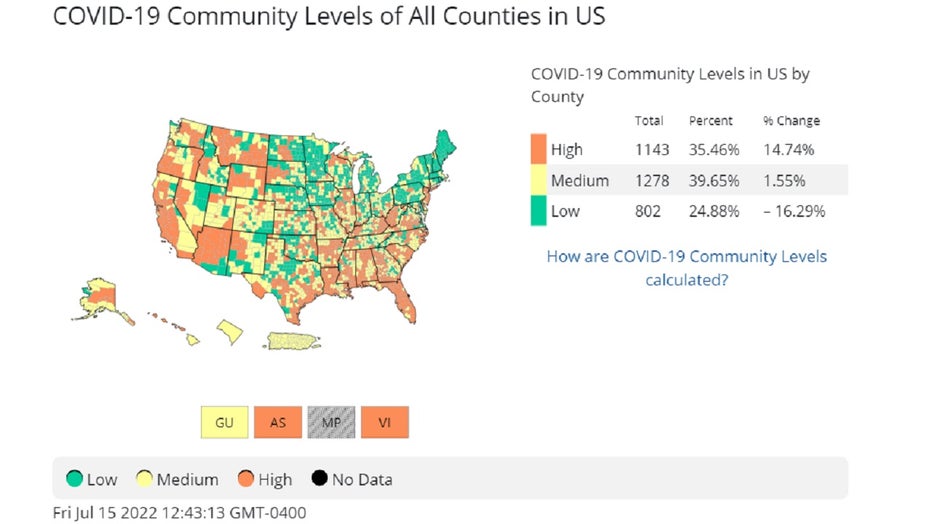White House doctor shares ways to protect yourself from new COVID-19 variant
Tips to protect yourself against new COVID-19 variant
The new BA.5 variant is spreading like wildfire across the country. In Georgia, cases have increased in the past week following the Fourth of July holiday. However, there are ways to stay safe from this new, more potent variant.
Atlanta - The Omicron BA.5 variant, the most transmissible strain so far in the pandemic, could complicate your summer travel plans.
White House Policy Advisor and internist Dr. Cameron Webb says BA.5 is causing reinfections sooner than has been seen with other variants.
"For much of this pandemic, people have thought that if they had an infection in the last 90 days, they were safer," Dr. Webb says. "With BA.5, we're seeing reinfections much sooner than that, a matter of weeks, as opposed to months."

So, Dr. Webb offered up a checklist for navigating BA.5.
First, he says, make sure you have at-home COVID-19 tests.
You can order them shipped to home for free on the website COVIDtests.gov.
If you develop COVID-19-like symptoms, he says, test yourself, even if you think you cannot possibly be positive again.
"So, if you have had COVID in the last few weeks, and you develop symptoms that feel like a cold, it's still important for you to test again, because that's going to help you figure out how to keep the people around you safe and how to minimize the spread of ongoing disease," Webb says.
Next up, if you test positive, isolate yourself from the people around you and reach out to your health provider.
"Make sure you talk to them about whether or not treatments would be appropriate for you," Dr. Webb says.
If you do not have a provider, he says, you can search for a "test-to-treat" location in your area on the website COVID.gov.
You may be eligible for Paxlovid, an antiviral pill designed for people at higher-risk of severe COVID-19.
Paxlovid is available at no charge if you do not have health insurance, and it can lower your risk of ending up in the hospital or dying by up to 90%, if taken within 3 days of the onset of symptoms.
"Even if you've had COVID-19 recently, and it was a mild case, that doesn't mean the reinfection is also going to be a mild case. So, it's important that you consider getting treatment for that," Webb says.
Next, he says, get up-to-date on your vaccinations and boosters.
The CDC recommends Americans 5 and older get a booster show at least 5 months after their second dose of the vaccine.
People 50 and older or adults with underlying health conditions that raise their risk of severe illness are eligible for a second booster shot at least 4 months after their first booster.
The FDA has asked vaccine manufacturers to update their fall booster vaccine to target the more recent omicron strains.
Webb says those bivalent vaccines are in development and could be ready by October or November.
If you are due for a booster, he recommends getting the shot now rather than waiting for a newer booster in the fall.
"Until they're available to you need to take advantage of the tools that are currently available," Webb says. "And, if it were me, I would get that vaccine today rather than to wait for some potential moment in the fall."
As of July 15, 2022, 75% of Americans were living in an area of the country with high or medium COVID-19 community levels, according to the CDC.
If you are in an area with medium or high COVID-19, Webb recommends wearing a good quality mask, such as an N95 or KN95, when you are in indoor, crowded spaces.
If you are planning to travel, the CDC recommends wearing a mask on public transportation, such as flights, and masking and staying 6 feet away from other travelers in terminals.
If you think you might need an antiviral, if you do get infected, Dr. Webb recommends researching your options at your travel destination, so you will know what to do if you test positive.
"And, then, make sure you have tests with you," Dr. Webb says. "Make sure you have the ability to make sure your stuffy nose or runny nose isn't actually COVID-19. If you do those things, you're putting yourself is a better place while traveling. It doesn't mean you can't travel at all, you just have to do so in a smart way."

